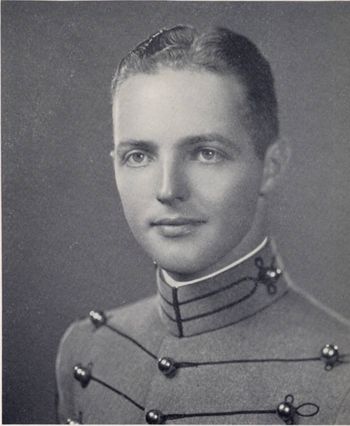ROB R. MCNAGNY, JR., 1LT, USA
Rob McNagny, Jr. '40
Lucky Bag
Rob Reed McNagny, Jr.. is listed on the page "And Some We Knew." He resigned on June 2, 1937.
The Howitzer (West Point Yearbook)
From the 1941 Howitzer:
ROB REED McNAGNY
Columbia City, Indiana
"Mac"
Ideal companion and fine wife was ex-middie Rob. Possessing a cheerful nature which gained him many friends, he won his sash as hop manager for four years. Unofficial public relations officer, he could always be found where the crowds were thickest. Playing a super-sax at the hops when not standing in the receiving line, he was admired by many of the fairer sex. However, the sash and sax did not win him half the admiration he gained with his friendly and respectful attitude to everyone.
Corporal (2), Sergeant (1), Hop Committee (4-3-2-1), Cadet Orchestra
Congressional Appointment

ROB REED McNAGNY
Columbia City, Indiana
"Mac"
Ideal companion and fine wife was ex-middie Rob. Possessing a cheerful nature which gained him many friends, he won his sash as hop manager for four years. Unofficial public relations officer, he could always be found where the crowds were thickest. Playing a super-sax at the hops when not standing in the receiving line, he was admired by many of the fairer sex. However, the sash and sax did not win him half the admiration he gained with his friendly and respectful attitude to everyone.
Corporal (2), Sergeant (1), Hop Committee (4-3-2-1), Cadet Orchestra
Congressional Appointment
Loss
Rob was lost on February 17, 1943 when the P-40K Warhawk he was flying crashed near Sarasota AAB, Florida. He was a member of the 303rd Fighter Squadron.
Obituary
From the West Point Association of Graduates:
"His loss has been a double one to us, and his fellow soldiers. His excellent qualities as a man made him one of the most popular and respected men in this organization, while his enthusiasm and ability as a pilot made him one of our most valuable. Officers and Enlisted Men alike feel keenly the loss of a fine friend, and the Army Air Forces have lost a superior pilot. No finer tribute can be paid him than to say that he died a soldier's death in time of war," wrote his commanding officer.
Lieut. Rob Reed McNagny, oldest son of Judge Rob R. and Helen V. McNagny, was born August 8, 1916, at Columbia City in the heart of Hoosierdom. Unlike most West Pointers, Mac had a professional background, his father, uncle and grandfather before him all being lawyers. The latter, William F. McNagny, served in the U.S. Congress from his district in 1892, and was for many years a law partner of the late Vice President Thomas R. Marshall.
But the law held no call for Mac. After graduation from High School at Columbia City he won a musical scholarship to Culver Military Academy, and there spent three happy, vigorous years. He graduated in 1936 with varsity letters in football, basketball and crew, was an able debater, won several firsts in boxing, a National Sharpshooter's medal J.G., was manager of the varsity basketball team, captain of the band, member of the glee club, and a frequent contributor to "The Quill."
At Culver his determination on an Army career had birth. There were no available appointments to West Point at the time, and he accepted an appointment to Annapolis instead, entering in the fall of 1936. Failing one spring exam in 1937, he again sought and won the coveted appointment to West Point, and entered the academy in 1937, graduating in June 1941.
A smiling, bright-eyed chap of even temperament, but with a dogged earnestness of purpose. Mac smiled himself into the respect and warm regard of his fellows. His high sense of honor and sportsmanship, his sympathy, his humor, and under it all an almost knightly consecration to Duty and Service, won and held friends. "He was the cleanest, most gallant gentleman I knew in Service," a friend says of him. "And he left not an enemy I know."
Never a top student, often burning the midnight oil to make his grade, he somehow found time for friendships and many activities in those crowded four years at West Point. His popularity among his fellows is attested by the fact that friends chaffed him on the appearance of his picture twenty-three different places in the 1941 Howitzer. He was Class Hop Club Manager four years, member of the cadet dance band three years, took part in cross-country running and intramural football, and graduated a first lieutenant of Company H.
But another urge was calling during the activities of cadet days—the urge to fly. Applying for assignment to the Air Corps, in August after graduation he entered preflight training at Tulsa, Oklahoma, and after basic at Randolph Feld graduated with his silver wings at Kelly Field in March 1942 and was detailed as a pursuit pilot to Dale Mabry Field, Tallahassee, Florida.
Changes followed fast in that year, and Mac's flashing smile became a bit grimmer. A commission as first lieutenant in June, details at Morris Field, No. Carolina, Aerial Gunnery at Myrtle Beach, So. Carolina, a brief tour at Spartansburg, a month's test flying at Patterson Field, Dayton, Fighter Command School at Orlando, and supervisory training with the 303rd Fighter Squadron, Sarasota Air Base, crowded fast one upon the other. The war in Africa was on now in grim earnest, and Mac sought desperately for a transfer which would "send him across." With an almost fanatical sense of duty to his country, he chafed under detention as an instructor of pilots, while friends and classmates were daily moving abroad to fight. But he doggedly perfected himself and the men under him in his craft—and hoped. During his year on wings his one keen disappointment was his failure to be sent abroad.
And finally one sunny morning at Sarasota the long sought orders came. He was directed to transfer to a new unit at Drew Field, where a wing was forming for early service abroad. Advancement, fighting, experience loomed. He took his plane up that February day with the lightest heart in months, and companions say his performance in that flight was flawless. But Fate has a way of putting its fingers into the plans of men. At the completion of what was scheduled as his last flight at Sarasota, in low elevation flying the projecting limb of a tree brushed a wing-tip, and Mac's proudest possession—the shining P-40—and its pilot, went crashing into eternity.
So died a gallant young officer, respected and trusted by his superiors, respected and well-loved by his fellows and the men he trained. But so ardent and determined a spirit must not have lived in vain. Men whose lives he touched, combat pilots he trained and taught the arts of war have spanned the seven seas in flight, boldly challenging the enemies of his cause and theirs. Somewhere out there in blue Mediterranean skies, or in China, Burma, or the Solomons—wherever U.S. pilots fly—Mac's dauntless spirit soars on with his fellows, determined still for the Cause for which he died.
Lieut. McNagny is survived by his parents, Judge and Mrs. Rob R. McNagny and a younger brother, DeWitt Kirk, of Columbia City, Indiana, and a sister, Miss Marilynn McNagny, of Indianapolis, Indiana.
He is buried in Indiana.
Memorial Hall Error
Rob is not listed with his classmates. He was identified through the diligent efforts of Leslie Poche, a volunteer who combed through Shipmate issues to find operational losses not accounted for in Memorial Hall.
Rob is one of 91 members of the Class of 1940 on Virtual Memorial Hall.

The "category" links below lead to lists of related Honorees; use them to explore further the service and sacrifice of alumni in Memorial Hall.